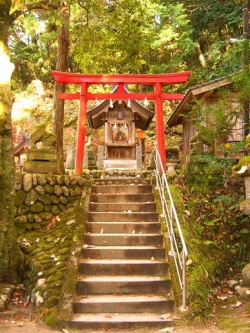Shrine
A shrine "case or chest for books or papers"; Old French: escrin "box or case") is a holy or sacred place, which is dedicated to a specific deity, ancestor worship, hero, martyr, saint, daemon or similar figure of awe and respect, at which they are venerated or worshipped.
Shrines often contain idols, relics, or other such objects associated with the figure being venerated.
A shrine at which votive offerings are made is called an altar. Shrines are found in many of the world's religions, including [[Wikipedia:Christianity|Christianity]], Islam, Hinduism, Buddhism, Wicca, Chinese folk religion and Shinto, as well as in secular and non-religious settings such as a war memorial. Shrines can be found in various settings, such as Church , temples, cemeteries , or in the home, although portable shrines are also found in some cultures.
Many shrines are located within buildings designed specifically for worship, such as a church in Christianity, or a mandir in Hinduism. A shrine here is usually the centre of attention in the building, and is given a place of prominence. In such cases, adherents of the faith assemble within the building in order to venerate the deity at the shrine.
Household shrines
Historically, in Hinduism, Buddhism and Roman Catholicism, and also in modern faiths, such as Neopaganism, a shrine can commonly be found within the home or shop. This shrine is usually a small structure or a setup of pictures and figurines dedicated to a deity that is part of the official religion, to ancestors or to a localised household deity.
Small household shrines are very common among the Chinese and people from South and Southeast Asia, whether Hindu, Buddhist or Christian. Usually a small lamp and small offerings are kept daily by the shrine. Buddhist household shrines must be on a shelf above the head; Chinese shrines must stand directly on the floor.
Yard shrines
Small outdoor yard shrines are found at the places of many peoples, following various religions. Many consist of a statue of saint, on a pedestal or in an alcove, while others may be elaborate booths without ceilings, some include paintings, statuary, and architectural elements, such as walls, roofs, glass doors and ironwork fences, etc.
In the United States, some Christians have small yard shrines; some of these resemble side altars, since they are composed of a statue placed in a niche or grotto; this type is colloquially referred to as a bathtub madonna.
Shrines are found in most, though not all, religions. As distinguished from a temple, a shrine usually houses a particular relic or cult image, which is the object of worship or veneration, or is constructed to set apart a site which is thought to be particularly holy, as opposed to being placed for the convenience of worshippers. Shrines therefore attract the practice of pilgrimage.
In Buddhism, a shrine refers to a place where veneration is focused on the Buddha or one of the bodhisattvas.
Monks, nuns and laypeople all give offerings to these revered figures at these shrines and also meditate in front of them.
Typically, Buddhist shrines contain a statue of either the Buddha, or (in the Mahayana and Vajrayana forms of Buddhism), one of the various bodhisattvas.
They also commonly contain candles, along with offerings such as flowers, purified water, food, and incense. Many shrines also contain sacred relics, such as the alleged tooth of the Buddha held at a shrine in Sri Lanka.
Site-specific shrines in Buddhism, particularly those that contain relics of deceased buddhas and revered monks, are often designed in the traditional form known as the stupa.
